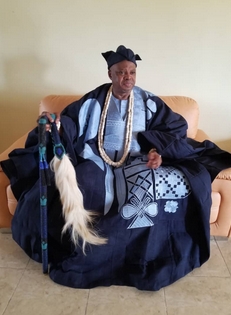
support@yorubalibrary.com
+2348073529208, 07038599574

The fashion of the Yoruba people of Nigeria is a dynamic blend of tradition, culture, and modern influences. This evolution reflects the rich heritage and adaptive nature of the Yoruba, blending historical elements with contemporary styles.
Traditional Yoruba Attire
Yoruba traditional attire is renowned for its elegance and symbolic significance. The primary garments include:
• Aso-Oke: This handwoven fabric is a hallmark of Yoruba culture. It is worn on special occasions such as weddings, festivals, and coronations. There are different types of Aso-Oke, such as Sanyan (woven from beige silk and cotton), Alaari (woven from red silk and cotton), and Etu (woven from blue and white threads).
• Agbada: A flowing, wide-sleeved robe worn by men, typically over a shirt and trousers. It is often elaborately embroidered and signifies status and wealth.
• Iro and Buba: This traditional attire for women consists of a wrapper (Iro) and a blouse (Buba). It is usually complemented with a head tie (Gele) and a shawl (Ipele).
Influence of Colonialism
The advent of colonialism introduced Western influences to Yoruba fashion. During this period, the Yoruba began incorporating European fabrics and styles into their traditional attire. Tailoring techniques from the West were adapted to create new forms of Yoruba clothing, merging European and African aesthetics.
Post-Colonial and Modern Yoruba Fashion
Post-independence, Yoruba fashion continued to evolve, blending tradition with modernity. The 1960s and 1970s saw a resurgence of traditional styles infused with contemporary trends. Fashion designers began experimenting with new materials and designs, leading to innovative styles that honored Yoruba heritage while embracing modernity.
Cultural and Social Significance
Fashion remains a crucial aspect of Yoruba culture, reflecting social status, identity, and heritage. Ceremonial attire, such as wedding garments and festival outfits, continue to play an essential role in Yoruba society. Each piece of clothing tells a story, whether it’s the history of a family, the status of an individual, or the cultural heritage of the Yoruba people.
The Global Influence
Yoruba fashion has transcended borders, influencing global fashion trends. Designers and fashion enthusiasts worldwide draw inspiration from Yoruba textiles, patterns, and styles. This global influence has not only helped preserve Yoruba culture but has also showcased its beauty and versatility to a wider audience.
Conclusion
The evolution of Yoruba fashion is a testament to the resilience and creativity of the Yoruba people. From traditional Aso-Oke and Agbada to contemporary designs that grace international runways, Yoruba fashion continues to evolve while maintaining its cultural roots.

Learn about the Yoruba concept of Ìwà Pẹ̀lẹ́ (good…

Learn special praises for Divine Being and Creator…